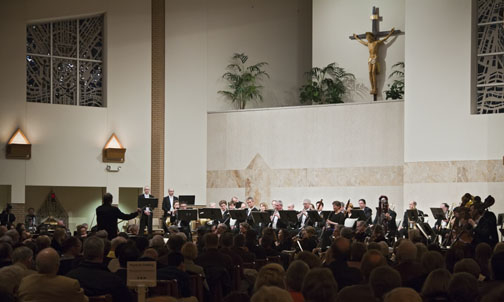Six-Month Strike Settled, Detroit’s Orchestra Plays On

Deep into a six-month strike, the Detroit Symphony had cancelled the fall and spring seasons. Music fans were afraid management unwillingness to seriously negotiate with the musicians would cost Detroit its magnificent orchestra. But musicians ratified a contract last week in a rush of bargaining capped by a 27-hour negotiating session. The next day conductor Leonard Slatkin led the musicians on stage and the audience of 2,000 rose, clapped, and hollered for two full minutes. It was a reminder that Detroit is still a town where workers’ rights are respected and music is valued. Once the tentative agreement was reached, management announced two free concerts; tickets were swept up within the hour. Management scrambled to schedule 14 concerts, with all seats selling at $20. A factor bringing management to the table was the approach of the summer season. “We are relieved that this struggle is over and we can get back on stage performing the world’s greatest music,” said Karl Pituch, principal horn and chair of the musicians’ negotiating committee. “But the problems which led to the strike and those who were responsible for those problems continue.” Orchestra management had made serious financial miscalculations, resulting in a $20 million deficit over the last three years and causing it to dip into its endowment. Currently those cash reserves have dwindled to $20 million, while the DSO owes a $54 million bond on a new music center. When management insisted that the musicians take more than a 33 percent cut in wages and benefits, the musicians felt management was demanding the workforce pay for its errors. Yet they also recognized that both the donor base and ticket sales have plunged over the last decade. Detroit’s symphony is hardly the only in dire straits. The Philadelphia orchestra filed for bankruptcy Monday, in order to nullify the musicians’ contract. Management is seeking a 16 percent pay cut and the destruction of union members’ pension plan. The players’ committee chairman said musicians already gave up overtime and took a salary freeze worth $12 million, but they’ve pledged not to strike if management doesn’t attempt to impose a contract, something the court would have to approve. In Detroit, management demanded job cuts, a pension freeze, reduced health care coverage, and a tiered wage scale with the entry wage cut by 42 percent. Managers wanted flexibility to send musicians out on individual teaching or performing assignments and an end to “blind” auditions, used in order to recruit the best, sight unseen. Musicians say the practice has had the effect of opening orchestras to women and people of color. Give $10 a month or more and get our "Fight the Boss, Build the Union" T-shirt. Willing to compromise over wages, musicians said they would take a 22 percent cut, but were determined that the cuts not affect the viability of the orchestra. Management’s wage scale, they said, would make it impossible to recruit first-class musicians. They successfully opposed a two-tier wage system and refused to allow orchestra librarians to be split from the bargaining unit and paid less. While previous base pay was $104,650, the musicians initially offered to accept $82,000, rising to $96,000 by the third year of the contract. In the end they settled for $79,000, rising to $82,900, with players earning up to $6,900 more if they choose to take part in community outreach programs. The union also preserved health insurance and pensions. Management wanted to significantly reduce the 96-member orchestra. Over the course of the strike, several musicians retired or took jobs elsewhere. Musicians agreed to start off with 81 members and rise to 85. In the end, the musicians agreed to a contract that represented a 25 percent overall cut over their previous one. The musicians built an impressive website, Facebook page, and Twitter account to tell their story and alert supporters to upcoming picket lines and concerts. During the strike they organized 19 concerts, charging $20-25 a ticket. These were held in churches and synagogues throughout the Detroit area, and it was clear that people who had never been to a concert before were attending. The musicians also worked with several high school orchestras, holding three concerts. At one concert held at a church next door to Orchestra Hall, management stationed leafleters at the front door with a flyer denouncing union officials for supposedly prolonging the strike. Supporters organized the Save Our Symphony website. SOS distributed wristbands and buttons, joined the musicians on picket lines, took out ads in newspapers, and contacted board members. Joseph Striplin, a native Detroiter and violinist in the orchestra since 1972, told the New York Times he blamed the board’s intransigence on members he described as “a mix of politically reactionary right-wing figures who never saw a union they didn’t hate.” But now the musicians are back, and music lovers are ecstatic.Management Blunders

SUPPORT LABOR NOTES
BECOME A MONTHLY DONOR





